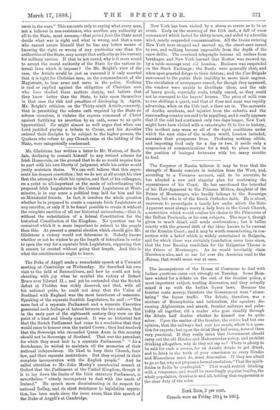New York has been visited by a storm so severe
as to be an event. Early on the morning of the 12th inst., a fall of snow commenced which lasted for thirty hours, and aided by a terrible wind, nearly suspended communication. All the trains entering New York were stopped and snowed up, the street-cars ceased to run, and walking became impossible from the depth of the snow-drifts. The overhead telegraphs became all useless from breakages, and New York learned that Boston was snowed up, by a cable-message sent rid London. Business was suspended on the Stock Exchange ; the Banks were generally shut, and when open granted delays to their debtors ; and the Fire Brigade announced to the public their inability to move their engines. The circulation of newspapers ceased, for though they appeared, the vendors were unable to distribute them, and the sale of heavy goods, especially coals, totally ceased, as they could not be conveyed to the buyers' houses. The price of milk rose to two shillings a quart, and that of flour and meat was rapidly advancing, when on the 15th inst, a thaw set in. The accounts of deaths, accidents, and injuries from the suburbs and the surrounding country are said to be appalling, and it really appears that if the cold had continued only two days longer, New York might have been visited with a catastrophe fit to live in history. The incident may warn us all of the rigid conditions under which the vast cities of the modern world, London included, maintain their prosperous lives. Producing nothing edible, and importing food only for a day or two, it needs only a suspension of communications for a week to place them in the position of besieged fortresses with too many mouths to feed.


































 Previous page
Previous page